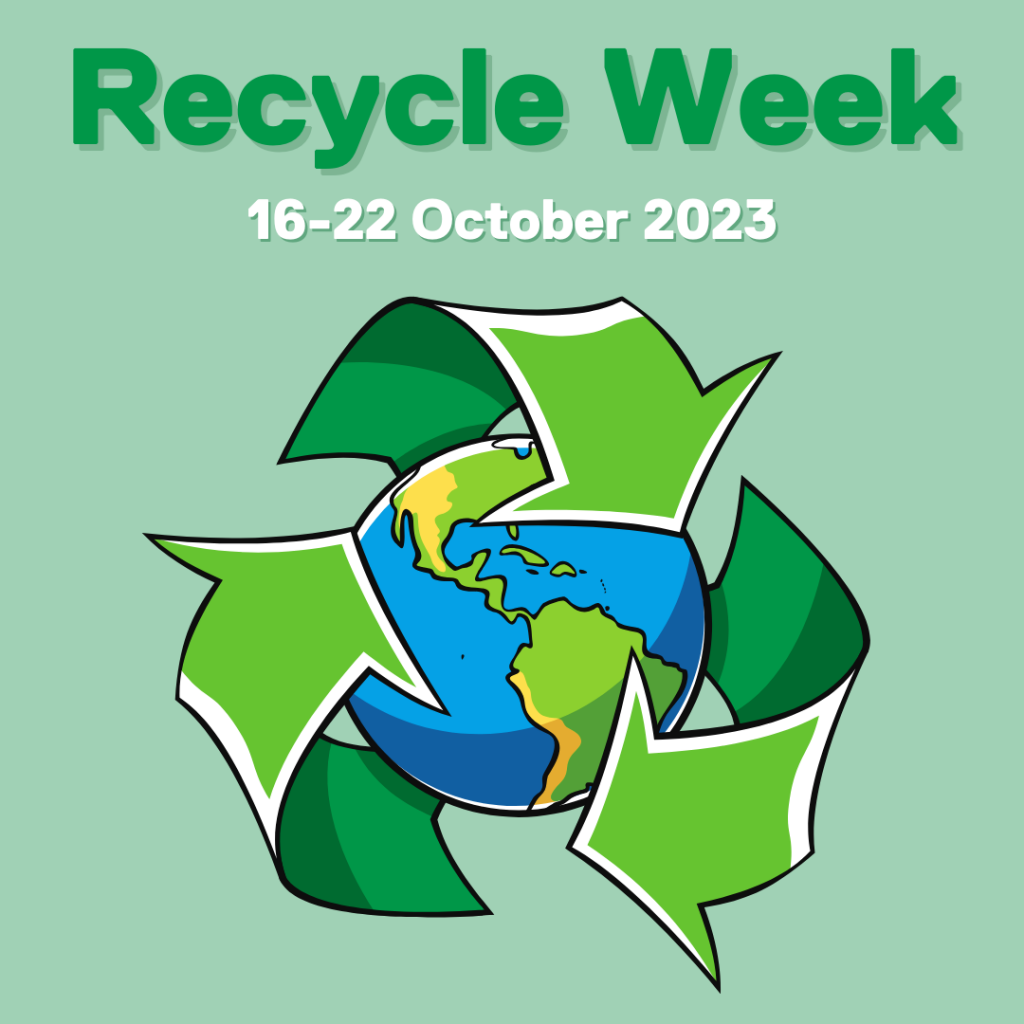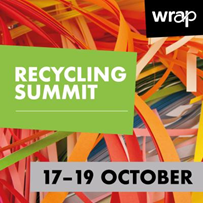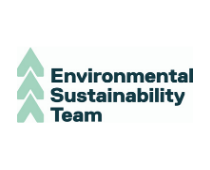Recycle Week is taking place between the 16th to the 22nd of October 2023. This year’s theme focuses on ‘missed capture’ items, which are products and items that can be recycled but are frequently missed or disposed of incorrectly. The national campaign is also celebrating its 20th anniversary and will be hosting a Recycling Summit during the week.

Guide to recycling at Salford
As the theme of this year’s Recycling Week is centred around ‘missed capture’ items, it is important to understand what we can recycle but also what we cannot. This is a quick guide about recycling at the University of Salford, along with some tips to help you generate less waste, and links to some useful resources!
What we can recycle
- Paper
This includes paper sheets, greeting cards, envelopes, newspapers, magazines, leaflets and junk mail. All of these items can be recycled, so throw them into the blue paper recycling bins.
Tip: To reduce the amount of paper you use, take your notes on a laptop or tablet. If that’s not an option, use the back of printed handouts from lectures and seminars instead of buying new notebooks.
- Plastic bottles
The only plastic items which can be recycled on our campuses are plastic bottles – these should be disposed of in the green mixed recycling bins.
Tip: Get a reusable bottle. There’s a number of water fountains on our campuses where you can refill your bottle for free – find them on the campus map here. And if you’re looking for ways to reduce your use of single-use plastics, join or follow our Plastic Free UoS campaign.
- Cans & tins
Both steel and aluminium food and drinks cans and tins can be recycled in the green mixed recycling bins. Please empty and rinse these before throwing them in the bin.
- Books
Books should not be disposed of in the general waste. Contact the Sustainability Office if you have any books you no longer want and they will be donated.
Tip: instead of buying new books, or throwing the old ones away, why not swap books with your course mates? And if you need to buy a book, check if you can get a second hand copy online, for example on Facebook Marketplace or Depop.
- Cardboard
Cardboard boxes should be flattened and placed next to the indoor recycling bins.
Tip: If you’ve got enough room for storage, keep the boxes you used when moving into your accommodation or house share, until you need to move again or transport items (e.g. to be donated).
- Chewing gum
Place it in the pink Gumdrop bins around campus – these will be collected and recycled.
- Clothing
We have two charity collection points at Frederick Road campus (TRAID) and Peel Park Quarter (Salvation Army).
- Electrical equipment
This includes IT equipment such as USB sticks, as well as kitchen appliances, phones, etc. Don’t dispose of these items by yourself as they can’t go into the general waste bin. Instead, get in touch with our team.
- Batteries
Batteries can’t be disposed of in the general waste. Get in touch with the Sustainability Office and we’ll help you dispose of these.
- Glass bottles and jars
If you’re disposing of small amounts of glass items (e.g., a single glass jar or bottle), throw it into a green mixed recycling bin. If it’s a larger amount, please get in touch with our team and we’ll take care of it for you. If you need to dispose of broken glass, wrap it securely in strong paper or a box, label it, and place it alongside waste bins.
What we can’t recycle
- Cling film and kitchen foil
While you can’t recycle these on campus, some supermarkets (such as Co-op) have the option of recycling these.
- Coffee cups
To hold hot drinks, coffee cups have a plastic lining inside. Unfortunately, that makes them nonrecyclable so these should be disposed of in general waste bins.
Tip: Get a reusable cup. There’s a large number of options to choose from and you can purchase one of these in most catering outlets on campus. Many coffee shops also offer a discount to customers who bring their own cup!
- Sandwich packets
Unfortunately, these cannot be recycled and should go to in general waste bin.
Tip: Make your lunch at home and carry it in a reusable container instead – this way you can reduce waste and save money.
- Shopping bags
Keep them to reuse, or take them to a supermarket which has got a collection point – you can find these here.
Tip: Try to avoid using single use plastic bags. Instead, if you can, switch to alternatives, such as a fabric tote bag or one of the sturdier, better quality shopping bags which you can get at supermarkets. If you do need to use a plastic bag, make sure to make the most out of its product life by reusing it when grocery shopping.
If in doubt…
If you’re ever unsure if an item is recyclable and don’t have an opportunity to check, it’s always best to choose the general waste bin. That’s to avoid what’s called “wishful recycling”, where non-recyclable items accidentally end up in recycling bins. This often leads to the whole waste loads from recycling bins being deemed “contaminated” by non-recyclable items and sent to landfill instead of being recycled.
Where to find more information…
If you live at home in Greater Manchester while at university, have a look at the Recycle for Greater Manchester website and their recycling guide. There is also a recycling guide for Salford where you can find out what you can recycle and your local recycling centres. You can also use this Recycling Locator tool by Recycle Now for guidance.
Also, if you have any questions about recycling on campus, please get in touch with the Sustainability Office and we’ll do our best to help. You can also test your recycling knowledge by taking our Recycling quiz.
Other useful resources
- Waste Reduction | University of Salford
- Recycling | University of Salford
- Recycling bins and advice | Salford City Council
- A-Z Recycling Guide | R4GM
- Things you might not know can be recycled | Recycle Now
- Understanding recycling symbols | Recycle Now
- How to recycle plastic bags and wrapping | Recycle Now
During Recycle Week, WRAP is hosting a Recycling Summit from the 17th to the 19th of October. It consists of online events with experts from WRAP and other industry professionals, as well as panel discussions with Recycle Week’s sponsors including Coca-Cola, Britvic, Tesco, Danone, Arla and Boots. A range of topics will be covered such as learning about the Let’s Go Zero Schools Campaign, the National Recycling Tracker, Local Authority Food Waste Collections, and Using Behavioural Science to Tackle Missed Capture and Contamination.
WRAP Webinars

Find out more & get tickets here:
Resources in the Library
There is also a stall in the foyer of the Clifford Whitworth Library, where you can find some recycling guides and tips.
WARP-it – information for staff members
We are also members of WARP-it (Waste Action Reuse Portal) which is a redistribution network, this platform makes it easy for University departments to give away, loan or claim items unwanted by others within the organisation. This can include anything from furniture to office consumables (e.g., stationary). We also engage with local charitable partners for donations of items that cannot be reused internally within the University! Get involved, register, add any surplus items from your office to the system and have a look around to see if there is anything your department needs.
Find out more here: Reuse at the University of Salford
Register here: Warp It home page for University of Salford
Easy-Access Training: Guide to Searching Items on Warp It // Guide to Adding an Item to Warp It
